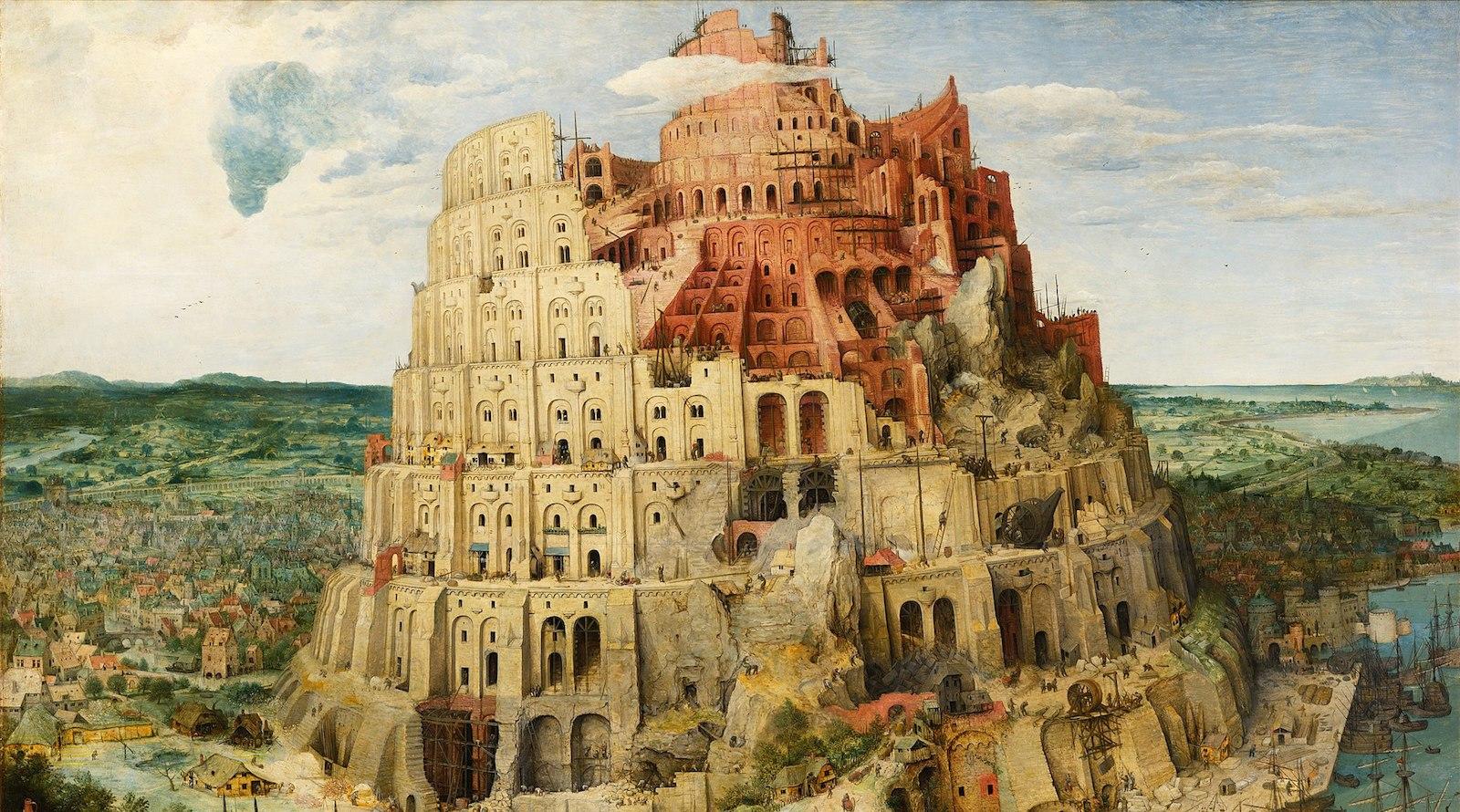Commentary on Parashat Noach, Genesis 6:9-11:32
The last mythological fragment we have in the before we come to the figure of Abraham is the Tower of Babel. With this episode the Torah turns its attention from the universal to the particular, from the history of humanity to the descendants of Shem, Noah’s firstborn son.
As preserved, the story is but nine verses–brief, insignificant and unedifying, not much more than a dismissive satire on Babylon. At best, we try to connect this fragment to the mystery of human language. If we are all progeny of Noah, how did we come to speak so many different languages?
But that question has a slightly academic ring to it. What is really missing at this juncture in the narrative of the Torah is an etiology of polytheism. Given that the polemic against polytheism plays such a central role in the canon of ancient Israel, why is there no speculation in narrative form as to how humanity strayed from monotheism to polytheism?
How Humanity Lost Its Way
Indeed, the early chapters of Genesis assume that our first ancestors were monotheists. They sensed intuitively that the built-in multiplicity of reality emanated from a single supreme deity with whom they could readily communicate. Adam and Eve “heard the sound of the Lord God moving about in the garden at the breezy time of day” (3:8). Cain and Abel and Noah after them offered sacrifices spontaneously to express their thanksgiving to God (4:3-4, 8:20). In short, we are left in the dark by the Torah as to how humanity lost its way theologically.

Help us keep Jewish knowledge accessible to millions of people around the world.
Your donation to My Jewish Learning fuels endless journeys of Jewish discovery. With your help, My Jewish Learning can continue to provide nonstop opportunities for learning, connection and growth.
It is that omission which prompted Maimonides, the most historically inclined of the medieval Jewish philosophers, to put forth a theory on the origins of polytheism. Humanity’s slippage was marked by good intentions. First, they paid homage to heavenly bodies out of the belief that God would be pleased by their honoring God’s entourage. Second, they put within the temples erected for this purpose physical images of God’s entourage. At this point, humanity was still cognizant that behind these signifiers God reigned supreme. But by the third stage that crucial link was broken. The effort to give physical and artistic expression to God brought humanity to worship the signifier as an idol that embodied transcendent power.
Examining The Context
According to Maimonides the mission of Abraham and the nation sprung from his loins was to repudiate that fragmented notion of transcendence along with the morality and mores that derive there from (MishnehTorah, Hilkhot Avodat Kokhavim 1:1). To overlook that historical context, Maimonides claimed in his Guide to the Perplexed was to render many of the Torah’s injunctions inexplicable (III, 37), and it is no accident that in his code the number of mitzvot [commandments] to be found in the book on idolatry (51) far exceeds the number in any other book.
Yet none of this ingenious speculation has any textual basis in the Torah. But it does give us a lens through which to look again at theTower of Babel. Several features of the story are noteworthy. It is a tale of estrangement. Whatever intimacy Noah may have enjoyed with God seems gone. The emphasis is on material matters. The inhabitants of Shinar take pride in their ability to compensate for their lack of natural resources. Well-made bricks were just as good as hewn stone, with which they could build an indestructible city and its temple. At the center of their world was the almighty self.
But God is less accessible in a man-made world. Surrounded by monuments of our own ingenuity, we grow deaf to the echoes of eternity. In the biblical tale, God’s voice is conspicuously absent. In the face of human arrogance, God withdraws to the most remote corner of the cosmos. Hence the desire to storm the heavens. The breakdown in communication can be restored by human effort.
Achieving Self-Mastery
The story mocks the very idea. To reach God there is no need to ascend to heaven. Twice the narrative stresses that God easily descends from on high. Not construction but contrition is what unites the human and divine;our inner state rather than a vast sacred precinct is what bridges the chasm.
The building of the tower then was an act of rebellion born of prosperity. In the phrase “and they settled there” ( Genesis11:2), the Rabbis felt a tone of finality. The migrants from the east ended their wanderings because they had come upon a land bursting with blessings. Yet what God had intended for good quickly became the source of their downfall. Self-satisfaction fed their arrogance (Tosefta Sotah 3:10), or as the Rabbis observed elsewhere, “A full stomach is the source of muchevil” (Babylonian Talmud, Berakhot 32a).
As an instance of rebellion, the Tower of Babel fits the dominant theme of the Torah’s prelude to Abraham. Human evil endangers God’s creation. Without restraint, man remains an undomesticated animal in the wild.The Rabbis speak of the Torah’s mitzvot as a yoke, a system of laws meant to harness human talent for good. As mere earthlings, we are prone to abuse our autonomy. The yoke of the divine helps us gain self-mastery. Polytheism is but a subset of the deviations which constitute human depravity. To move from one to many languages implies the move from one to many Gods. Mired in things material we lose sight of the spiritual. Rebellion against God subverts the destiny envisioned for us at the beginning as partners in the sustaining of creation.
Provided by the Jewish Theological Seminary, a Conservative rabbinical seminary and university of Jewish studies. Reprinted with permission of the Jewish Theological Seminary.



